GALLUP NEWS SERVICE
PRINCETON, NJ -- With President George W. Bush sworn in for a second term and a Republican majority returning to Congress, some ambitious goals are being set for dealing with the federal tax system. One aim is making permanent the various tax cuts passed during the Bush adminstration's first four years in the White House, which are otherwise set to expire. The other is restructuring the federal tax code to make it fit better with the president's political and economic objectives.
Tuesday, Gallup Poll Editor in Chief Frank Newport addressed the major questions surrounding public support for the Bush administration and Republican Congress' focus on modifying Social Security. Here are answers to some questions often asked about public opinion on tax reform:
1. Do Americans agree that the U.S. tax code needs revamping?
The White House Web site puts the president's tax reform position in these terms: "President Bush believes that America's taxpayers deserve, and our future economic prosperity demands, a simpler, fairer, pro-growth system." The White House acknowledges the first step toward this goal will be the creation of a bipartisan panel to "advise the Secretary of the Treasury on options for reforming the tax code."
Americans generally agree that changes need to be made to the tax system. Fifty-nine percent believe the tax system needs to be "completely overhauled" (24%) or needs "major changes" (35%). Only 40% think the tax system needs "minor changes" or "is fine the way it is."
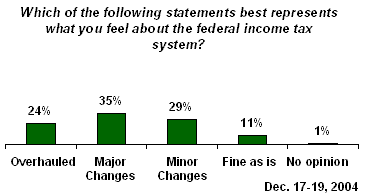
2. Do Americans agree that tax reform should be a congressional priority?
Earlier this week, Senate Majority Leader Bill Frist (R-Tenn.) promised that tax reform will be among the first pieces of legislation introduced by Republicans in the new session. However, a recent CNN/USA Today/Gallup poll suggests that the public does not share that sense of urgency on taxes. When respondents were asked to rate the importance of 18 issues confronting the president and Congress in the next year, taxes ranked 13th, well behind terrorism, education, healthcare costs, and Social Security, among other issues.
Despite favoring an overhaul or major changes to the tax system, only a quarter of Americans think taxes are an "extremely important" issue for the president and Congress to deal with in the coming year.
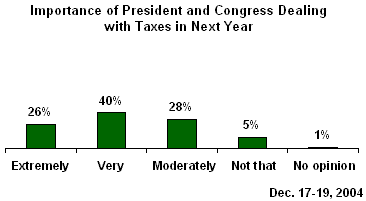
Because another 40% describe the tax issue as "very important," the overall balance of opinion on this question is in favor of legislative action on taxes. Overall, 66% describe the issue as either extremely or very important while only one-third consider it moderately important or not important at all.
However, whether focusing only on those who rate the issue extremely important or including those who call it very important, the tax issue is relatively low on the list of Americans' issue priorities.
- The top-rated issue of importance to Americans is the situation
in Iraq: 51% call this extremely important.
- Terrorism, education, healthcare costs, the economy, and Social
Security are all cited as extremely important by at least 40% of
Americans.
- Taxes ranks on par with immigration, energy policies, and the
environment in perceived importance.
- Only tort reform, abortion, minority rights legislation, and gay civil unions rank lower than taxes.
9. How important is it to you that the president and
Congress deal with each of the following issues in the next
year?
|
2004 Dec 17-19 |
Extremely |
Extremely/Very important |
|
% |
% |
|
|
The situation in Iraq |
51 |
90 |
|
Terrorism |
49 |
87 |
|
Education |
44 |
86 |
|
Healthcare costs |
42 |
87 |
|
The economy |
40 |
86 |
|
Social Security |
40 |
82 |
|
Unemployment |
35 |
77 |
|
The federal budget deficit |
35 |
77 |
|
Foreign affairs |
31 |
74 |
|
Poverty and homelessness |
29 |
71 |
|
Energy policies |
27 |
72 |
|
Immigration |
27 |
65 |
|
Taxes |
26 |
66 |
|
The environment |
24 |
62 |
|
Limits on lawsuits |
22 |
52 |
|
Abortion |
19 |
41 |
|
Laws to help blacks and other racial minorities |
16 |
47 |
|
Same-sex marriages or civil unions |
16 |
35 |
3. Do Americans agree with the president's approach on taxes?
A hallmark of President Bush's first term is the tax cuts he championed in 2001. Last fall, the U.S. House and Senate voted to extend four of these for the third time: three middle-class tax cuts and one business tax cut.
It is Bush's intent to make these tax cuts permanent -- a goal favored by a slim majority of Americans. A December CNN/USA Today/Gallup poll found 52% of Americans favoring making Bush's federal income tax cuts permanent; 40% are opposed.
However, as the trend shows, this support has waned some compared with November 2002, when 64% were in favor of extending those tax cuts.
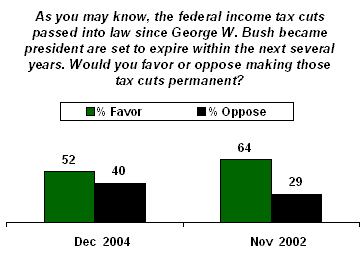
One reason the latest extension received such strong bipartisan support is that it only involved tax cuts affecting the middle class (such as the $1,000-per-child income tax credit), and not the politically charged capital gains tax cut, which will not expire until 2009. Still, some Democrats in Congress attempted unsuccessfully to offset these tax cuts with increases in taxes on wealthy Americans.
Gallup trend data on tax fairness indicates that Americans are sympathetic to the "tax the rich" argument. Americans tend to believe lower-income people pay too much, and they are divided over whether middle-income people pay too much or pay their fair share. However, they widely believe that wealthy Americans and corporations pay too little.
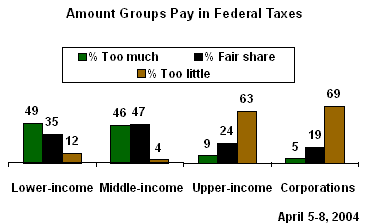
4. Do Americans have confidence in President Bush on the tax issue?
Americans are sharply divided in their assessments of Bush on taxes. According to Gallup's broadest measure, 49% of Americans approve of the way Bush is handling taxes, while 47% disapprove.
The public's current net approval (approval minus disapproval) on Bush's handling of taxes is the lowest tax rating he's received as president. However, Bush's approval rating on taxes tends to be linked with his overall approval rating, and thus the current level could be attributed to the fact that his overall rating is also relatively low.
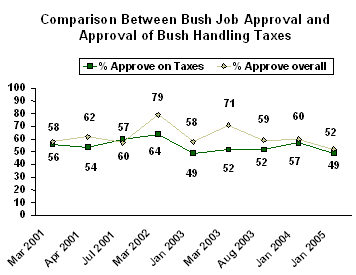
When asked specifically about tax reform, 49% predict Bush will be able to improve the federal tax system in his second term; 47% say he will not. "Improving the federal tax system" ranks about halfway down a list of actions that the public feels Bush will accomplish in his second term. The list ranges from a high of 73% for improving the country's military security, to a low of 26% for reducing the federal budget deficit.
11. Next I have some questions about the Bush administration. Whether or not you support Bush, do you think the Bush administration will or will not be able to do each of the following in its second term in office?
|
2005 Jan 14-16 |
|
|
|
% |
% |
|
|
Improve military security for the country |
73 |
26 |
|
Keep the country safe from terrorism |
68 |
30 |
|
Keep America prosperous |
62 |
35 |
|
Improve education |
58 |
40 |
|
Improve moral values in the United States |
57 |
41 |
|
Increase respect for the presidency |
54 |
45 |
|
Improve respect for the United States abroad |
50 |
48 |
|
Improve the federal tax system |
49 |
47 |
|
Improve the healthcare system |
44 |
53 |
|
Ensure the long-term strength of the Medicare system |
42 |
53 |
|
Ensure the long-term strength of the Social Security system |
40 |
57 |
|
Improve the quality of the environment |
39 |
57 |
|
Heal political divisions in this country |
33 |
64 |
|
Reduce the federal budget deficit |
26 |
70 |
5. How politicized is the tax issue with the general public?
Republicans and independents see more need for major changes and overhaul of the federal tax system than do Democrats, however these differences are not large. Half of Democrats and 60% of Republicans believe the system needs either major changes or overhaul.
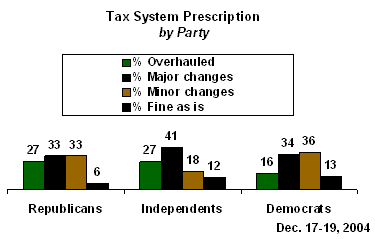
More disagreement is found over the issue of making Bush's first-term tax cuts permanent. Two-thirds of Republicans favor the proposal, whereas nearly two-thirds of Democrats oppose it. Independents side more with Republicans on this issue, as 55% favor the permanent extension of the tax cuts.
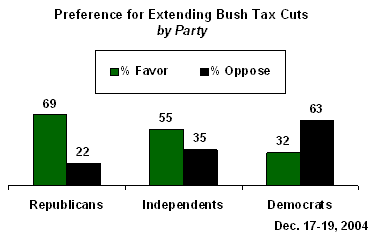
The most partisan disagreement is found in reactions to the job Bush is doing on taxes.
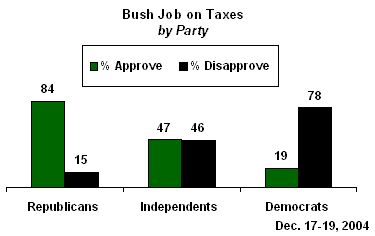
6. How do Americans feel about the taxes they pay?
Gallup trends indicate that a majority of Americans (62%) consider the amount they pay in taxes to be "fair." However, only 38% of Americans say they are "very" or "somewhat" satisfied with the amount Americans pay in federal taxes; 60% are "very" or "somewhat" dissatisfied. This positions taxes near the bottom of the list of policy areas Americans are satisfied with, and suggests Bush is on the right track, politically, by pushing for reform.
19. Next, we'd like to know how you feel about the state of the nation in each of the following areas. For each one, please say whether you are -- very satisfied, somewhat satisfied, somewhat dissatisfied, or very dissatisfied. If you don't have enough information about a particular subject to rate it, just say so. How about -- [ITEMS A-T ROTATED, THEN ITEM U READ]?
|
2005 Jan 3-5 |
Very satisfied |
Total satisfied |
Total dissatisfied |
|
% |
% |
% |
|
|
The nation's military strength and preparedness |
28 |
66 |
31 |
|
The position of women in the nation |
21 |
69 |
28 |
|
The role America plays in world affairs |
17 |
52 |
44 |
|
The position of blacks and other racial minorities in the nation |
15 |
57 |
35 |
|
The nation's laws or policies on guns |
15 |
51 |
43 |
|
The quality of medical care in the nation |
15 |
45 |
54 |
|
The nation's security from terrorism |
14 |
58 |
39 |
|
The nation's policies regarding the abortion issue |
13 |
42 |
47 |
|
The nation's policies to reduce or control crime |
11 |
57 |
39 |
|
The quality of the environment in the nation |
10 |
54 |
42 |
|
The state of race relations |
9 |
53 |
37 |
|
The quality of public education in the nation |
9 |
40 |
58 |
|
The Social Security and Medicare systems |
8 |
31 |
65 |
|
The availability of affordable healthcare |
7 |
25 |
73 |
|
The state of the nation's economy |
6 |
47 |
51 |
|
The amount Americans pay in federal taxes |
6 |
38 |
60 |
|
The acceptance of homosexuality in the nation |
6 |
32 |
60 |
|
The nation's efforts to deal with poverty and homelessness |
6 |
28 |
69 |
|
The nation's energy policies |
5 |
39 |
45 |
|
The level of immigration into the country today |
4 |
30 |
62 |
|
The nation's campaign finance laws |
4 |
24 |
53 |
Survey Methods
The most recent results are based on telephone interviews with a randomly selected national sample of 1,007 adults, aged 18 and older, conducted Jan. 14-16, 2005. For results based on this sample, one can say with 95% confidence that the maximum error attributable to sampling and other random effects is ±3 percentage points. In addition to sampling error, question wording and practical difficulties in conducting surveys can introduce error or bias into the findings of public opinion polls.